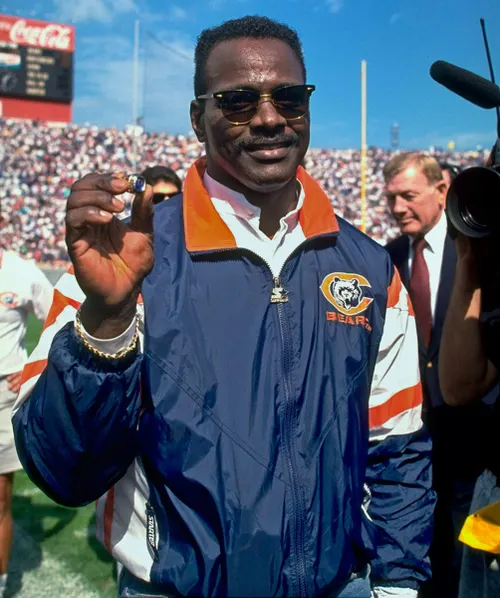When historians, analysts, and diehard fans reflect on the most iconic teams in NFL history, one name is often spoken with reverence and awe: the 1985 Chicago Bears. That team, a brutal, swagger-filled ensemble of talent and attitude, didn’t just win a Super Bowl — they redefined what it meant to dominate. And right in the heart of that historic defense stood Steve “Mongo” McMichael, a ferocious defensive tackle whose grit, leadership, and relentless motor made him a cornerstone of the team’s identity.
While the ‘85 Bears were loaded with legends — Mike Singletary, Richard Dent, Dan Hampton, Gary Fencik, Wilber Marshall, and coached by the fiery Mike Ditka — Steve McMichael carved his own path and left behind a legacy that resonates just as powerfully decades later. More than just a football player, McMichael embodied the soul of a city and the intensity of a defense that was, quite literally, untouchable.
The Heart of the Monsters of the Midway
The 1985 Bears defense is still considered by many to be the greatest single-season defense in NFL history. They led the league in points allowed (198), total yards allowed, takeaways (54), and sacks (64). Their infamous “46 defense,” masterminded by defensive coordinator Buddy Ryan, was a feral, blitz-happy scheme designed to wreak havoc on quarterbacks and confuse offensive linemen into paralysis. And no one relished the chaos more than McMichael.
Steve McMichael, born in Austin, Texas, and drafted by the New England Patriots in 1980, found his NFL home in Chicago in 1981 after being cut by the Patriots. His journey from castoff to anchor of the league’s most feared defense is nothing short of remarkable.
Standing 6-foot-2 and weighing around 270 pounds, McMichael was not the most imposing figure on the field — but he possessed something immeasurable: relentless effort, incredible hand strength, a high football IQ, and a willingness to do the dirty work that allowed stars like Dent and Singletary to thrive. He played with a nastiness that was admired by teammates and feared by opponents.
“Mongo didn’t get all the headlines, but without him, we’re not the ’85 Bears,” Hall of Fame defensive tackle Dan Hampton once said. “He was the glue guy. He did the work in the trenches that made everything else possible.”
The Personality Behind the Helmet
If Mike Ditka was the face of the team, and Walter Payton was its heart, then Steve McMichael was its mouth — loud, unfiltered, hilarious, and brash. McMichael was a perfect embodiment of the Bears’ identity: blue-collar toughness mixed with outsized charisma. He wasn’t afraid to speak his mind, whether it was trash talk directed at opponents or jokes at the expense of his own teammates.
He also knew how to play to the cameras, which made him a favorite in the locker room and a media darling in Chicago. His post-game interviews were legendary, and his antics during the team’s “Super Bowl Shuffle” video, which has since become a cultural touchstone, only added to his fame.
That larger-than-life personality eventually led McMichael to a post-football career in professional wrestling and broadcasting, further cementing his status as one of Chicago’s most beloved athletes.

